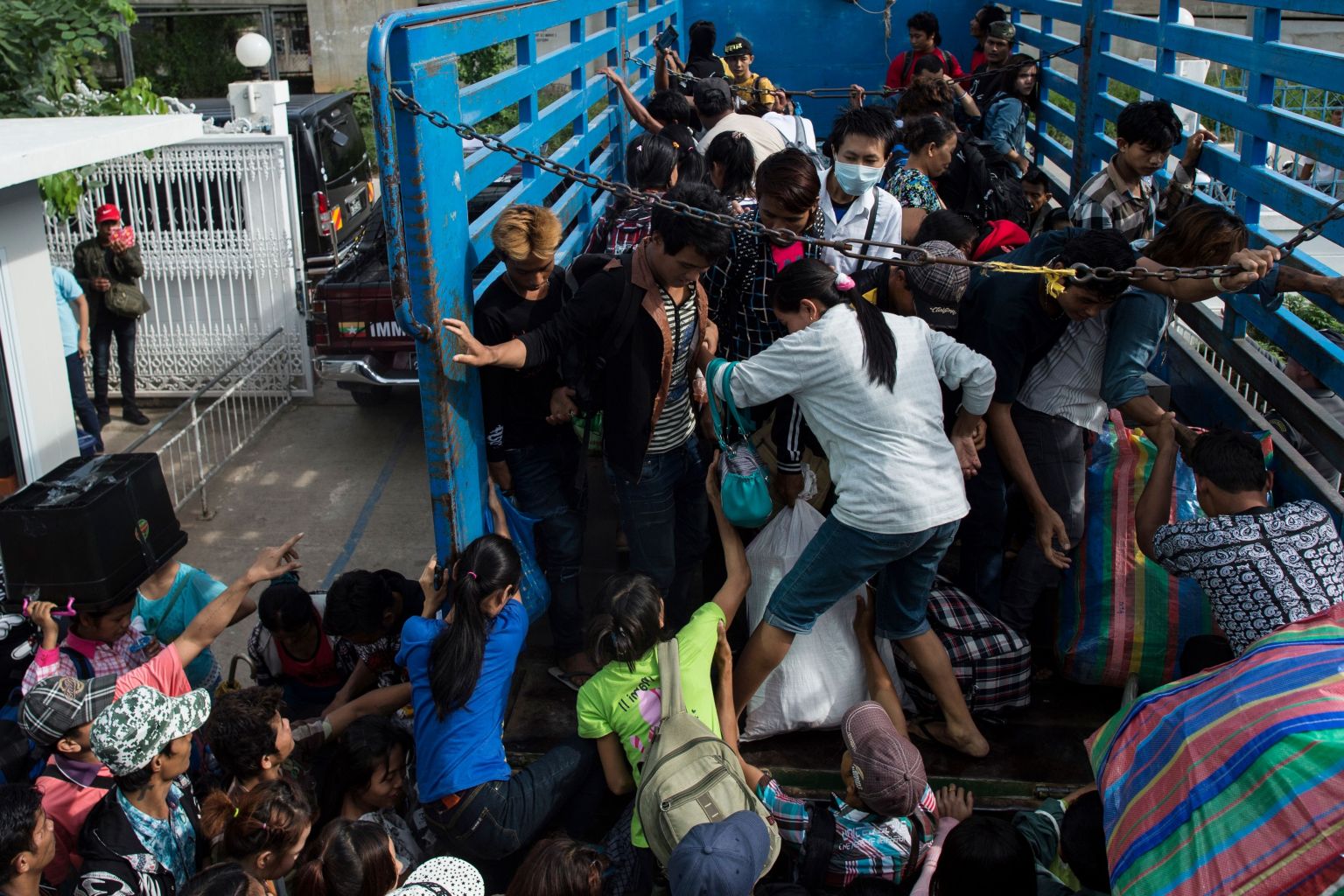Asean 2018: More work to be done on labour migration
A consensus between Asean countries is a relief but the 2017 Asean Consensus does not carry legal weight
Sign up now: Get ST's newsletters delivered to your inbox

Migrant workers boarding trucks leaving Thailand at the Thai-Myanmar border in Mae Sot, in northern Thailand. Several issues on labour issues still need to be resolved by Asean members.
PHOTO: AFP
Nearly seven million - or two-thirds - of approximately 10 million international migrants living and working in Asean come from within the region. In 2017, the 8 per cent of the world's migrants were from the Asean countries.
The majority of these are low-skilled and undocumented workers in the construction, plantations and domestic services sectors.
Asean member states such as Cambodia, Indonesia, Myanmar, the Philippines and Vietnam are the main "sending" countries, and Thailand, Malaysia and Singapore are the main "receiving" countries.
Bilateral agreements between the sending and receiving countries usually have reference to the domestic laws and regulations in the receiving countries.
Migrant workers are also affected by their own country's labour export policies and exploitative practices of unscrupulous employment agencies.
Many of them fill the gaps vacated by nationals of the destination countries.
Female migrant workers from countries such as Cambodia, Laos, Myanmar, Thailand and the Philippines are also vulnerable to sexual exploitation and modern-day slavery in the entertainment or service industries.
Uneven pre-departure preparation procedures have affected the lives of many domestic helpers. There are cases of abuse by employers, as well as cases of murder or violence committed by domestic helpers.
Yet many still indebt themselves to recruitment agencies to get the job. Not all migrants have recourse to assistance and redress, although civil society organisations in both sending and receiving countries try hard to bridge information gaps.
The annual Asean Labour Ministers Meeting provides a venue for discussion of region-wide concerns on labour and employment, with bilateral issues discussed on the sidelines.
Labour migration as a regional priority gained prominence in 2007 when the Philippines -then Asean chair - led the drafting and adoption of the Asean Declaration on the Protection and Promotion of the Rights of Migrant Workers.
The Asean Committee on Migrant Workers (ACMW) was established in July 2007 as the negotiating body for a regional instrument. The ACMW created the annual Asean Forum on Migrant Labour, the first of its kind for a regional organisation, to bring together government, civil society and international organisations' inputs.
When regional negotiations started in 2009, the sending and receiving countries found that their positions clashed on issues such as the legal or moral nature of the instrument, and whether to include undocumented workers and migrant workers' families in its scope.
Indonesia and the Philippines pushed for a legal instrument with the inclusion of undocumented workers and migrant workers' families, while Singapore, Malaysia and Thailand expressed their concern that this may invite higher numbers of undocumented migrants, placing more strain on existing policies, regulations and infrastructure.
In February 2017, Asean labour ministers reached agreement on "almost all aspects of the three principal issues", and the Philippines, once again Asean chair, ceded that the instrument would be morally binding.
An eleventh-hour insistence by Indonesia to keep the instrument legally binding stalled adoption till November 2017, when the Asean heads of state/government signed the Asean Consensus on the Promotion and Protection of the Rights of Migrant Workers.
The sheer fact that labour-sending and labour-receiving countries in Asean have managed to reach a compromise on a divisive issue after nearly eight years of negotiation is something of a relief.
But the 2017 Asean Consensus does not carry legal weight, and will not require member states to ratify the document nationally for implementation.
Asean has stated that the document carries a moral weight for national governments to implement measures that address the commitments expressed in the document. This satisfies neither sending nor receiving countries, nor the civil society and stakeholder groups which participated in regional negotiations.
Civil society groups are concerned that some Asean member states may drag out national ratification processes, affecting enforcement of the provisions.
The document's Chapter 7 highlights that commitments of the Asean members states will be "in accordance with national laws, regulations and policies". This reflects the nature of reaching agreement in an Asean setting, and the negotiated compromise that Asean governments are willing to accept at this juncture.
As a general rule, Asean member states' conclusion and implementation of regional agreements are subject to their national capacities and domestic political consensus. Therefore, even after the advent of the Asean Charter, Asean countries still prefer non-binding declarations to enjoy flexibility in the transposition of regional commitments to their national plans.
Even if Asean governments can agree for the instrument to be legally binding, civil society stakeholders have highlighted their concern that some Asean members may drag out the national ratification processes, which will in turn affect enforcement of the instrument's provisions.
As such, issues and concerns of migrant workers will not disappear from the regional agenda.
The writer is a Lead Researcher at the ASEAN Studies Centre, ISEAS-Yusof Ishak Institute, in Singapore. This article is an adapted version of a commentary published in the ASEAN Focus magazine of the institute.


